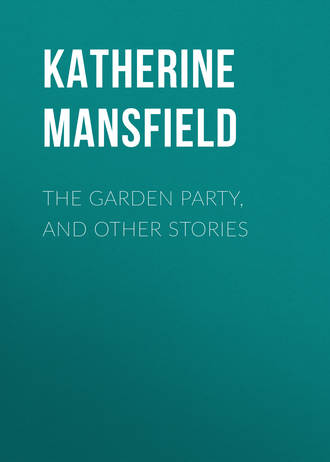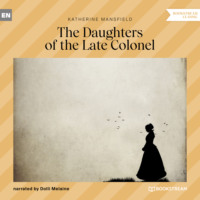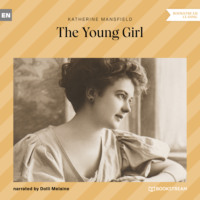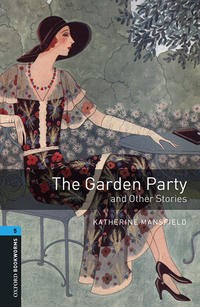 полная версия
полная версияThe Garden Party, and Other Stories
“Will you stay in the car while I go and look?”
But no—she wouldn’t do that. Good heavens, no! Hennie could stay. She couldn’t bear sitting in a car. She’d wait on the steps.
“But I scarcely like to leave you,” I murmured. “I’d very much rather not leave you here.”
At that she threw back her coat; she turned and faced me; her lips parted. “Good heavens—why! I—I don’t mind it a bit. I—I like waiting.” And suddenly her cheeks crimsoned, her eyes grew dark—for a moment I thought she was going to cry. “L—let me, please,” she stammered, in a warm, eager voice. “I like it. I love waiting! Really—really I do! I’m always waiting—in all kinds of places… ”
Her dark coat fell open, and her white throat—all her soft young body in the blue dress—was like a flower that is just emerging from its dark bud.
6. LIFE OF MA PARKER
When the literary gentleman, whose flat old Ma Parker cleaned every Tuesday, opened the door to her that morning, he asked after her grandson. Ma Parker stood on the doormat inside the dark little hall, and she stretched out her hand to help her gentleman shut the door before she replied. “We buried ‘im yesterday, sir,” she said quietly.
“Oh, dear me! I’m sorry to hear that,” said the literary gentleman in a shocked tone. He was in the middle of his breakfast. He wore a very shabby dressing-gown and carried a crumpled newspaper in one hand. But he felt awkward. He could hardly go back to the warm sitting-room without saying something—something more. Then because these people set such store by funerals he said kindly, “I hope the funeral went off all right.”
“Beg parding, sir?” said old Ma Parker huskily.
Poor old bird! She did look dashed. “I hope the funeral was a—a—success,” said he. Ma Parker gave no answer. She bent her head and hobbled off to the kitchen, clasping the old fish bag that held her cleaning things and an apron and a pair of felt shoes. The literary gentleman raised his eyebrows and went back to his breakfast.
“Overcome, I suppose,” he said aloud, helping himself to the marmalade.
Ma Parker drew the two jetty spears out of her toque and hung it behind the door. She unhooked her worn jacket and hung that up too. Then she tied her apron and sat down to take off her boots. To take off her boots or to put them on was an agony to her, but it had been an agony for years. In fact, she was so accustomed to the pain that her face was drawn and screwed up ready for the twinge before she’d so much as untied the laces. That over, she sat back with a sigh and softly rubbed her knees…
“Gran! Gran!” Her little grandson stood on her lap in his button boots. He’d just come in from playing in the street.
“Look what a state you’ve made your gran’s skirt into—you wicked boy!”
But he put his arms round her neck and rubbed his cheek against hers.
“Gran, gi’ us a penny!” he coaxed.
“Be off with you; Gran ain’t got no pennies.”
“Yes, you ‘ave.”
“No, I ain’t.”
“Yes, you ‘ave. Gi’ us one!”
Already she was feeling for the old, squashed, black leather purse.
“Well, what’ll you give your gran?”
He gave a shy little laugh and pressed closer. She felt his eyelid quivering against her cheek. “I ain’t got nothing,” he murmured…
The old woman sprang up, seized the iron kettle off the gas stove and took it over to the sink. The noise of the water drumming in the kettle deadened her pain, it seemed. She filled the pail, too, and the washing-up bowl.
It would take a whole book to describe the state of that kitchen. During the week the literary gentleman “did” for himself. That is to say, he emptied the tea leaves now and again into a jam jar set aside for that purpose, and if he ran out of clean forks he wiped over one or two on the roller towel. Otherwise, as he explained to his friends, his “system” was quite simple, and he couldn’t understand why people made all this fuss about housekeeping.
“You simply dirty everything you’ve got, get a hag in once a week to clean up, and the thing’s done.”
The result looked like a gigantic dustbin. Even the floor was littered with toast crusts, envelopes, cigarette ends. But Ma Parker bore him no grudge. She pitied the poor young gentleman for having no one to look after him. Out of the smudgy little window you could see an immense expanse of sad-looking sky, and whenever there were clouds they looked very worn, old clouds, frayed at the edges, with holes in them, or dark stains like tea.
While the water was heating, Ma Parker began sweeping the floor. “Yes,” she thought, as the broom knocked, “what with one thing and another I’ve had my share. I’ve had a hard life.”
Even the neighbours said that of her. Many a time, hobbling home with her fish bag she heard them, waiting at the corner, or leaning over the area railings, say among themselves, “She’s had a hard life, has Ma Parker.” And it was so true she wasn’t in the least proud of it. It was just as if you were to say she lived in the basement-back at Number 27. A hard life!…
At sixteen she’d left Stratford and come up to London as kitching-maid. Yes, she was born in Stratford-on-Avon. Shakespeare, sir? No, people were always arsking her about him. But she’d never heard his name until she saw it on the theatres.
Nothing remained of Stratford except that “sitting in the fire-place of a evening you could see the stars through the chimley,” and “Mother always ‘ad ‘er side of bacon, ‘anging from the ceiling.” And there was something—a bush, there was—at the front door, that smelt ever so nice. But the bush was very vague. She’d only remembered it once or twice in the hospital, when she’d been taken bad.
That was a dreadful place—her first place. She was never allowed out. She never went upstairs except for prayers morning and evening. It was a fair cellar. And the cook was a cruel woman. She used to snatch away her letters from home before she’d read them, and throw them in the range because they made her dreamy… And the beedles! Would you believe it?—until she came to London she’d never seen a black beedle. Here Ma always gave a little laugh, as though—not to have seen a black beedle! Well! It was as if to say you’d never seen your own feet.
When that family was sold up she went as “help” to a doctor’s house, and after two years there, on the run from morning till night, she married her husband. He was a baker.
“A baker, Mrs. Parker!” the literary gentleman would say. For occasionally he laid aside his tomes and lent an ear, at least, to this product called Life. “It must be rather nice to be married to a baker!”
Mrs. Parker didn’t look so sure.
“Such a clean trade,” said the gentleman.
Mrs. Parker didn’t look convinced.
“And didn’t you like handing the new loaves to the customers?”
“Well, sir,” said Mrs. Parker, “I wasn’t in the shop above a great deal. We had thirteen little ones and buried seven of them. If it wasn’t the ‘ospital it was the infirmary, you might say!”
“You might, indeed, Mrs. Parker!” said the gentleman, shuddering, and taking up his pen again.
Yes, seven had gone, and while the six were still small her husband was taken ill with consumption. It was flour on the lungs, the doctor told her at the time… Her husband sat up in bed with his shirt pulled over his head, and the doctor’s finger drew a circle on his back.
“Now, if we were to cut him open here, Mrs. Parker,” said the doctor, “you’d find his lungs chock-a-block with white powder. Breathe, my good fellow!” And Mrs. Parker never knew for certain whether she saw or whether she fancied she saw a great fan of white dust come out of her poor dead husband’s lips…
But the struggle she’d had to bring up those six little children and keep herself to herself. Terrible it had been! Then, just when they were old enough to go to school her husband’s sister came to stop with them to help things along, and she hadn’t been there more than two months when she fell down a flight of steps and hurt her spine. And for five years Ma Parker had another baby—and such a one for crying!—to look after. Then young Maudie went wrong and took her sister Alice with her; the two boys emigrated, and young Jim went to India with the army, and Ethel, the youngest, married a good-for-nothing little waiter who died of ulcers the year little Lennie was born. And now little Lennie—my grandson…
The piles of dirty cups, dirty dishes, were washed and dried. The ink-black knives were cleaned with a piece of potato and finished off with a piece of cork. The table was scrubbed, and the dresser and the sink that had sardine tails swimming in it…
He’d never been a strong child—never from the first. He’d been one of those fair babies that everybody took for a girl. Silvery fair curls he had, blue eyes, and a little freckle like a diamond on one side of his nose. The trouble she and Ethel had had to rear that child! The things out of the newspapers they tried him with! Every Sunday morning Ethel would read aloud while Ma Parker did her washing.
“Dear Sir,—Just a line to let you know my little Myrtil was laid out for dead… After four bottils… gained 8 lbs. in 9 weeks, and is still putting it on.”
And then the egg-cup of ink would come off the dresser and the letter would be written, and Ma would buy a postal order on her way to work next morning. But it was no use. Nothing made little Lennie put it on. Taking him to the cemetery, even, never gave him a colour; a nice shake-up in the bus never improved his appetite.
But he was gran’s boy from the first…
“Whose boy are you?” said old Ma Parker, straightening up from the stove and going over to the smudgy window. And a little voice, so warm, so close, it half stifled her—it seemed to be in her breast under her heart—laughed out, and said, “I’m gran’s boy!”
At that moment there was a sound of steps, and the literary gentleman appeared, dressed for walking.
“Oh, Mrs. Parker, I’m going out.”
“Very good, sir.”
“And you’ll find your half-crown in the tray of the inkstand.”
“Thank you, sir.”
“Oh, by the way, Mrs. Parker,” said the literary gentleman quickly, “you didn’t throw away any cocoa last time you were here—did you?”
“No, sir.” “Very strange. I could have sworn I left a teaspoonful of cocoa in the tin.” He broke off. He said softly and firmly, “You’ll always tell me when you throw things away—won’t you, Mrs. Parker?” And he walked off very well pleased with himself, convinced, in fact, he’d shown Mrs. Parker that under his apparent carelessness he was as vigilant as a woman.
The door banged. She took her brushes and cloths into the bedroom. But when she began to make the bed, smoothing, tucking, patting, the thought of little Lennie was unbearable. Why did he have to suffer so? That’s what she couldn’t understand. Why should a little angel child have to arsk for his breath and fight for it? There was no sense in making a child suffer like that.
… From Lennie’s little box of a chest there came a sound as though something was boiling. There was a great lump of something bubbling in his chest that he couldn’t get rid of. When he coughed the sweat sprang out on his head; his eyes bulged, his hands waved, and the great lump bubbled as a potato knocks in a saucepan. But what was more awful than all was when he didn’t cough he sat against the pillow and never spoke or answered, or even made as if he heard. Only he looked offended.
“It’s not your poor old gran’s doing it, my lovey,” said old Ma Parker, patting back the damp hair from his little scarlet ears. But Lennie moved his head and edged away. Dreadfully offended with her he looked—and solemn. He bent his head and looked at her sideways as though he couldn’t have believed it of his gran.
But at the last… Ma Parker threw the counterpane over the bed. No, she simply couldn’t think about it. It was too much—she’d had too much in her life to bear. She’d borne it up till now, she’d kept herself to herself, and never once had she been seen to cry. Never by a living soul. Not even her own children had seen Ma break down. She’d kept a proud face always. But now! Lennie gone—what had she? She had nothing. He was all she’d got from life, and now he was took too. Why must it all have happened to me? she wondered. “What have I done?” said old Ma Parker. “What have I done?”
As she said those words she suddenly let fall her brush. She found herself in the kitchen. Her misery was so terrible that she pinned on her hat, put on her jacket and walked out of the flat like a person in a dream. She did not know what she was doing. She was like a person so dazed by the horror of what has happened that he walks away—anywhere, as though by walking away he could escape…
It was cold in the street. There was a wind like ice. People went flitting by, very fast; the men walked like scissors; the women trod like cats. And nobody knew—nobody cared. Even if she broke down, if at last, after all these years, she were to cry, she’d find herself in the lock-up as like as not.
But at the thought of crying it was as though little Lennie leapt in his gran’s arms. Ah, that’s what she wants to do, my dove. Gran wants to cry. If she could only cry now, cry for a long time, over everything, beginning with her first place and the cruel cook, going on to the doctor’s, and then the seven little ones, death of her husband, the children’s leaving her, and all the years of misery that led up to Lennie. But to have a proper cry over all these things would take a long time. All the same, the time for it had come. She must do it. She couldn’t put it off any longer; she couldn’t wait any more… Where could she go?
“She’s had a hard life, has Ma Parker.” Yes, a hard life, indeed! Her chin began to tremble; there was no time to lose. But where? Where?
She couldn’t go home; Ethel was there. It would frighten Ethel out of her life. She couldn’t sit on a bench anywhere; people would come arsking her questions. She couldn’t possibly go back to the gentleman’s flat; she had no right to cry in strangers’ houses. If she sat on some steps a policeman would speak to her.
Oh, wasn’t there anywhere where she could hide and keep herself to herself and stay as long as she liked, not disturbing anybody, and nobody worrying her? Wasn’t there anywhere in the world where she could have her cry out—at last?
Ma Parker stood, looking up and down. The icy wind blew out her apron into a balloon. And now it began to rain. There was nowhere.
7. MARRIAGE A LA MODE
On his way to the station William remembered with a fresh pang of disappointment that he was taking nothing down to the kiddies. Poor little chaps! It was hard lines on them. Their first words always were as they ran to greet him, “What have you got for me, daddy?” and he had nothing. He would have to buy them some sweets at the station. But that was what he had done for the past four Saturdays; their faces had fallen last time when they saw the same old boxes produced again.
And Paddy had said, “I had red ribbing on mine bee-fore!”
And Johnny had said, “It’s always pink on mine. I hate pink.”
But what was William to do? The affair wasn’t so easily settled. In the old days, of course, he would have taken a taxi off to a decent toyshop and chosen them something in five minutes. But nowadays they had Russian toys, French toys, Serbian toys—toys from God knows where. It was over a year since Isabel had scrapped the old donkeys and engines and so on because they were so “dreadfully sentimental” and “so appallingly bad for the babies’ sense of form.”
“It’s so important,” the new Isabel had explained, “that they should like the right things from the very beginning. It saves so much time later on. Really, if the poor pets have to spend their infant years staring at these horrors, one can imagine them growing up and asking to be taken to the Royal Academy.”
And she spoke as though a visit to the Royal Academy was certain immediate death to any one…
“Well, I don’t know,” said William slowly. “When I was their age I used to go to bed hugging an old towel with a knot in it.”
The new Isabel looked at him, her eyes narrowed, her lips apart.
“Dear William! I’m sure you did!” She laughed in the new way.
Sweets it would have to be, however, thought William gloomily, fishing in his pocket for change for the taxi-man. And he saw the kiddies handing the boxes round—they were awfully generous little chaps—while Isabel’s precious friends didn’t hesitate to help themselves…
What about fruit? William hovered before a stall just inside the station. What about a melon each? Would they have to share that, too? Or a pineapple, for Pad, and a melon for Johnny? Isabel’s friends could hardly go sneaking up to the nursery at the children’s meal-times. All the same, as he bought the melon William had a horrible vision of one of Isabel’s young poets lapping up a slice, for some reason, behind the nursery door.
With his two very awkward parcels he strode off to his train. The platform was crowded, the train was in. Doors banged open and shut. There came such a loud hissing from the engine that people looked dazed as they scurried to and fro. William made straight for a first-class smoker, stowed away his suit-case and parcels, and taking a huge wad of papers out of his inner pocket, he flung down in the corner and began to read.
“Our client moreover is positive… We are inclined to reconsider… in the event of—” Ah, that was better. William pressed back his flattened hair and stretched his legs across the carriage floor. The familiar dull gnawing in his breast quietened down. “With regard to our decision—” He took out a blue pencil and scored a paragraph slowly.
Two men came in, stepped across him, and made for the farther corner. A young fellow swung his golf clubs into the rack and sat down opposite. The train gave a gentle lurch, they were off. William glanced up and saw the hot, bright station slipping away. A red-faced girl raced along by the carriages, there was something strained and almost desperate in the way she waved and called. “Hysterical!” thought William dully. Then a greasy, black-faced workman at the end of the platform grinned at the passing train. And William thought, “A filthy life!” and went back to his papers.
When he looked up again there were fields, and beasts standing for shelter under the dark trees. A wide river, with naked children splashing in the shallows, glided into sight and was gone again. The sky shone pale, and one bird drifted high like a dark fleck in a jewel.
“We have examined our client’s correspondence files… “ The last sentence he had read echoed in his mind. “We have examined… “ William hung on to that sentence, but it was no good; it snapped in the middle, and the fields, the sky, the sailing bird, the water, all said, “Isabel.” The same thing happened every Saturday afternoon. When he was on his way to meet Isabel there began those countless imaginary meetings. She was at the station, standing just a little apart from everybody else; she was sitting in the open taxi outside; she was at the garden gate; walking across the parched grass; at the door, or just inside the hall.
And her clear, light voice said, “It’s William,” or “Hillo, William!” or “So William has come!” He touched her cool hand, her cool cheek.
The exquisite freshness of Isabel! When he had been a little boy, it was his delight to run into the garden after a shower of rain and shake the rose-bush over him. Isabel was that rose-bush, petal-soft, sparkling and cool. And he was still that little boy. But there was no running into the garden now, no laughing and shaking. The dull, persistent gnawing in his breast started again. He drew up his legs, tossed the papers aside, and shut his eyes.
“What is it, Isabel? What is it?” he said tenderly. They were in their bedroom in the new house. Isabel sat on a painted stool before the dressing-table that was strewn with little black and green boxes.
“What is what, William?” And she bent forward, and her fine light hair fell over her cheeks.
“Ah, you know!” He stood in the middle of the room and he felt a stranger. At that Isabel wheeled round quickly and faced him.
“Oh, William!” she cried imploringly, and she held up the hair-brush: “Please! Please don’t be so dreadfully stuffy and—tragic. You’re always saying or looking or hinting that I’ve changed. Just because I’ve got to know really congenial people, and go about more, and am frightfully keen on—on everything, you behave as though I’d—” Isabel tossed back her hair and laughed—“killed our love or something. It’s so awfully absurd”—she bit her lip—“and it’s so maddening, William. Even this new house and the servants you grudge me.”
“Isabel!”
“Yes, yes, it’s true in a way,” said Isabel quickly. “You think they are another bad sign. Oh, I know you do. I feel it,” she said softly, “every time you come up the stairs. But we couldn’t have gone on living in that other poky little hole, William. Be practical, at least! Why, there wasn’t enough room for the babies even.”
No, it was true. Every morning when he came back from chambers it was to find the babies with Isabel in the back drawing-room. They were having rides on the leopard skin thrown over the sofa back, or they were playing shops with Isabel’s desk for a counter, or Pad was sitting on the hearthrug rowing away for dear life with a little brass fire shovel, while Johnny shot at pirates with the tongs. Every evening they each had a pick-a-back up the narrow stairs to their fat old Nanny.
Yes, he supposed it was a poky little house. A little white house with blue curtains and a window-box of petunias. William met their friends at the door with “Seen our petunias? Pretty terrific for London, don’t you think?”
But the imbecile thing, the absolutely extraordinary thing was that he hadn’t the slightest idea that Isabel wasn’t as happy as he. God, what blindness! He hadn’t the remotest notion in those days that she really hated that inconvenient little house, that she thought the fat Nanny was ruining the babies, that she was desperately lonely, pining for new people and new music and pictures and so on. If they hadn’t gone to that studio party at Moira Morrison’s—if Moira Morrison hadn’t said as they were leaving, “I’m going to rescue your wife, selfish man. She’s like an exquisite little Titania”—if Isabel hadn’t gone with Moira to Paris—if—if…
The train stopped at another station. Bettingford. Good heavens! They’d be there in ten minutes. William stuffed that papers back into his pockets; the young man opposite had long since disappeared. Now the other two got out. The late afternoon sun shone on women in cotton frocks and little sunburnt, barefoot children. It blazed on a silky yellow flower with coarse leaves which sprawled over a bank of rock. The air ruffling through the window smelled of the sea. Had Isabel the same crowd with her this week-end, wondered William?
And he remembered the holidays they used to have, the four of them, with a little farm girl, Rose, to look after the babies. Isabel wore a jersey and her hair in a plait; she looked about fourteen. Lord! how his nose used to peel! And the amount they ate, and the amount they slept in that immense feather bed with their feet locked together… William couldn’t help a grim smile as he thought of Isabel’s horror if she knew the full extent of his sentimentality.
“Hillo, William!” She was at the station after all, standing just as he had imagined, apart from the others, and—William’s heart leapt—she was alone.
“Hallo, Isabel!” William stared. He thought she looked so beautiful that he had to say something, “You look very cool.”
“Do I?” said Isabel. “I don’t feel very cool. Come along, your horrid old train is late. The taxi’s outside.” She put her hand lightly on his arm as they passed the ticket collector. “We’ve all come to meet you,” she said. “But we’ve left Bobby Kane at the sweet shop, to be called for.”
“Oh!” said William. It was all he could say for the moment.
There in the glare waited the taxi, with Bill Hunt and Dennis Green sprawling on one side, their hats tilted over their faces, while on the other, Moira Morrison, in a bonnet like a huge strawberry, jumped up and down.
“No ice! No ice! No ice!” she shouted gaily.
And Dennis chimed in from under his hat. “Only to be had from the fishmonger’s.”
And Bill Hunt, emerging, added, “With whole fish in it.”
“Oh, what a bore!” wailed Isabel. And she explained to William how they had been chasing round the town for ice while she waited for him. “Simply everything is running down the steep cliffs into the sea, beginning with the butter.”









